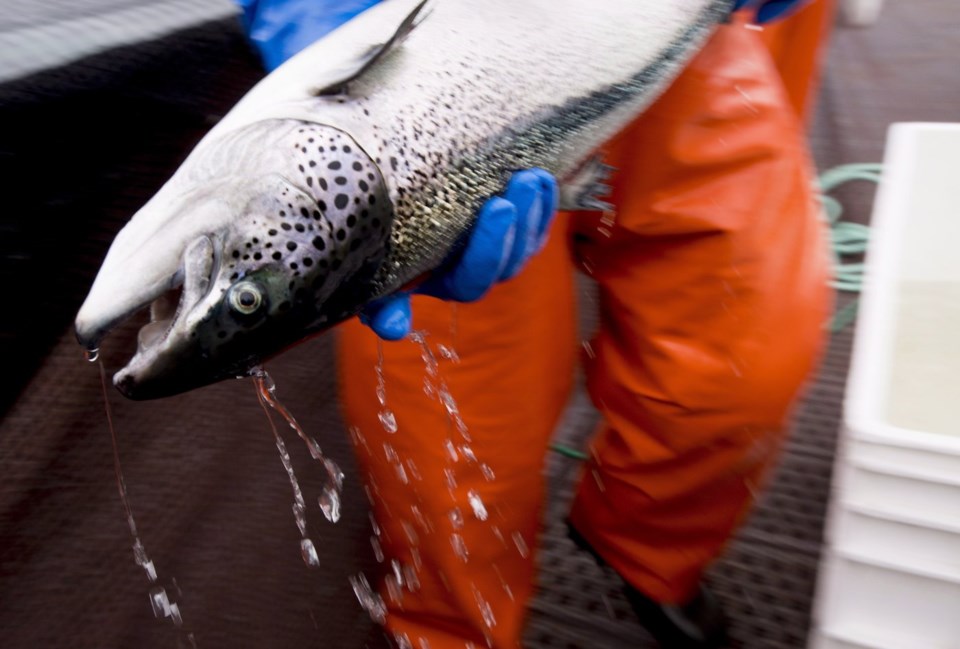VANCOUVER — Federal Fisheries Minister Diane Lebouthillier says the country's "strict rules" on banning open-net salmon farming are necessary, since the goal is to make British Columbia "a model" in global aquaculture
Lebouthillier said Thursday the government decision to delay the closure of ocean-based farms is a balance between the demand for farmed fish as a protein source and the need to protect wild salmon populations in British Columbia's waters.
"When it comes to the oceans, with climate change, all the wild species currently are facing challenges around the world," Lebouthillier said at a Vancouver news conference on a separate funding announcement on salmon restoration.
"We know that we also need to ensure food security, so what has been put in place are, for me, strict rules at the industry level but with the objective … to ensure that British Columbia becomes a model in the world when it comes to aquaculture."
Lebouthillier's comments came a day after she announced the ban in Ottawa, saying aquaculture must move to containment models by 2029.
That date gives communities and businesses an extra five years from the original 2025 deadline to transition away from open-net salmon farming, a delay that has caused a rift between –°¿∂ ”∆µ's First Nations who are concerned about job losses for their communities and how to better protect wild salmon.
Ahousaht Nation Hereditary Chief Hasheukumiss said an extra five years isn't long enough to facilitate such a costly and complex transition to land-based fish farms.
Many –°¿∂ ”∆µ First Nations are where open-net fish farms operate, and community leaders say a disruption to the industry would bring "severe" affects to their members' well-being.
"Our rights have been dismissed in favour of privileged, liberal, urban-riding political narrative," Ahousaht Nation Hereditary Chief Hasheukumiss said during a news conference with five First Nations leaders on Wednesday.
"Five years to transition to land-based or closed containment in my territory is the same as shutting our operations down; we do not have the land or the supporting power infrastructure to do this."
Coalition of First Nations for Finfish Stewardship spokesman Dallas Smith of the Tlowitsis Nation described the idea of banning open-net salmon farms as "an activist-driven agenda to divide First Nations" in British Columbia.
"This industry is only 40 years old on the coast of British Columbia," Smith said. "The energy sector has years to meet some of their objectives that government sets. The forest sector has had centuries … but this sector is given five years to try and make a paradigm shift? It's irresponsible."
The Union of British Columbia Indian Chiefs, however, issued a statement Thursday welcoming the transition plan, calling it "a step in the right direction."
“We have been strongly advocating for an end to open-net pen fish farming for years and are grateful that the government of Canada has listened to our concerns including the sacred role of salmon to our people, and to the undeniable scientific evidence that fish farms have put our wild salmon at risk," said union president Grand Chief Stewart Phillip.
First Nations Wild Salmon Alliance chairman Bob Chamberlin appeared with federal officials in Vancouver during the announcement of the ban Wednesday, and said the framing of open-net opponents as "activists" isn't accurate.
Chamberlin noted the Federal Court's rejection this month of an application to review Ottawa's decision not to renew licences of 15 open-net farms, where Judge Paul Favel found then-fisheries minister Joyce Murray met her duties to consult stakeholders and "did not breach the operators' rights of procedural fairness."
"The First Nation Wild Salmon Alliance bases the position that we're advancing … on details and facts of court rulings and government process," Chamberlin said in an interview Thursday. "So, if they are calling us activists, then they are calling federal judges activists, they're also calling the auditor general an activist (and) the chief scientist of Canada an activist."
He said that, just as the opposing First Nations say they are upholding their rights in opposing the open-net ban, supporting First Nations are doing the same in "standing up to protect their Aboriginal rights" in protecting wild salmon.
The conservation group Pacific Wild relayed its opposition to the five-year delay by putting out a video featuring Canadian actor William Shatner, where he declares his opposition to the farms using numerous profanities, which are bleeped out throughout.
Lebouthillier said in Vancouver Thursday that Industry Minister Francois-Philippe Champagne would be in –°¿∂ ”∆µ soon to meet with First Nations affected by the pending ocean open-net farm ban.
"Work is going to happen with indigenous communities, with the people from the aquaculture sector," she said of the next five years leading up to the open-net deadline.
When asked if federal money is coming to support the transition away from open-net farming, she said there's work to be done to help communities and the aquaculture industry to propel them towards the future.
As part of her appearance in Vancouver, Lebouthillier announced a number of projects approved for the next phase of funding through the British Columbia Salmon Restoration and Innovation Fund, including a $5-million investment for revitalizing habitat in the Fraser River Estuary.
This report by The Canadian Press was first published June 20, 2024.
Chuck Chiang, The Canadian Press




